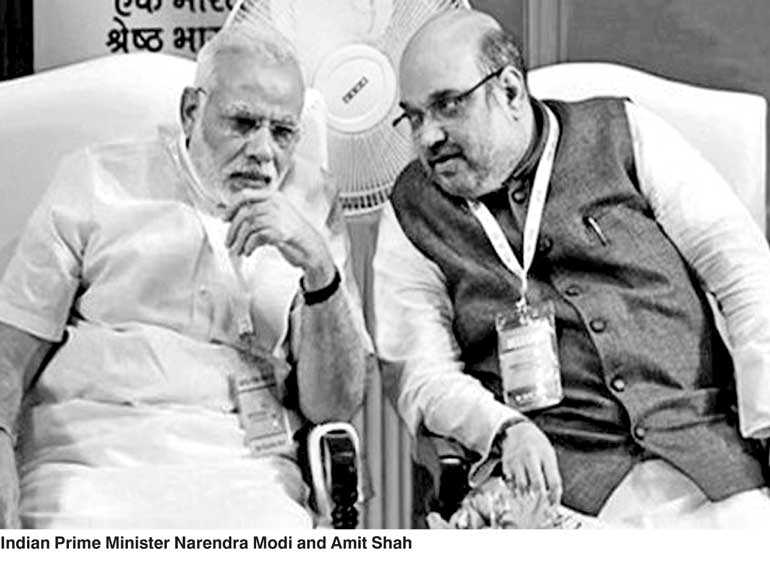Tuesday Feb 17, 2026
Tuesday Feb 17, 2026
Saturday, 2 June 2018 00:05 - - {{hitsCtrl.values.hits}}

With just 11 months to go for the next Indian Parliamentary elections, the ruling Bharatiya Janata Party (BJP) led by the ebullient Prime Minister Narendra Modi got a severe drubbing in the by-elections held in nine States on Monday.
Opposition parties on Thursday won 11 of 14 State Assembly and Lok Sabha seats, including the prestigious Kairana Parliamentary constituency in Uttar Pradesh.
The saving grace for the BJP came from Maharashtra where it defeated the Shiv Sena in a keen contest for the Palghar Lok Sabha seat. In Uttarakhand, the BJP won the Tharali assembly seat while its National Democratic Alliance (NDA) partner National Democratic Progressive Party (NDPP), took the Nagaland Lok Sabha seat
The BJP won only one of the 10 Assembly constituencies which had by-elections. On the other hand, the Congress led by Rahul Gandhi bagged three seats (in Maharashtra, Meghalaya and Punjab).
Others secured six seats. The Jharkhand MukthiMorcha (JMM) got two in Jharkhand, while the Communist Party of India (Marxist), Samajwadi Party (SP), Rashtriya Nanata Dal (RJD), and the Trinamool Congress (TC) got one each in Kerala, UP, Bihar and West Bengal, respectively.
In Meghalaya, the Congress became the single largest party after its candidate, Miani D Shira, won the by-election from Ampati Assembly seat.
Dangerously close to losing majority
A series of defeats in Parliamentary by-elections this year has seen the BJP slip dangerously close to the halfway mark of 270. Its numbers in Parliament had slipped from 282 in May 2014 to 273 in 2018.
Any further erosion will mean that it has to rely on its allies to survive in power. If that happens its clout within the National Democratic Alliance (NDA) will be that much less, and the smaller allies, with 23 seats, will start dictating terms, a demoralising prospect ahead of the 2019 Parliamentary polls.
Two parties have already left the NDA. These are Shiv Sena (SS) and the Telugu Desam Party (TDP) have declared that they would go it alone in the 2019 elections.
The recent resignations by two BJP MPs, B.S. Yeddyurappa and B. Sreeramulu, to become Members of Karnataka State Assembly in Karnataka, had created critical vacancies in Parliament, which given the anti-BJP wave, could be filled by any other party.
Earlier, the BJP had been trounced by the Congress in the Ajmer and Alwar Assembly constituencies in Rajasthan. This was bad news for the BJP because the Rajasthan State Assembly is to go for elections later this year.
The BJP had suffered shocking defeats in Gorakhpur and Phulpur parliamentary constituencies in Uttar Pradesh. It was shocking because these were held by Yogi Adityanath and Keshav Prasad Maurya, the Chief Minister and Deputy Chief Minister respectively of Uttar Pradesh State.
In Thursday’s by-poll results, the BJP lost the Kairana Parliamentary seat in Uttar Pradesh it had previously held. The Rashtriya Lok Dal (RLD) candidate Tabassum Hasan won to become the first Muslim MP from UP in the current Lok Sabha.
Four reasons for BJP’s decline
 There are four reasons for the defeat of the BJP in many parts of India in recent months.
There are four reasons for the defeat of the BJP in many parts of India in recent months.
The first is the unification of the opposition. It was an utterly divided opposition which had enabled the BJP with 31.36 % of the popular vote to get 282 of the 545 seats in Parliament in 2014. This time round, from the Karnataka Assembly elections onwards, the opposition has been united to defeat the BJP.
The second reason is the BJP Government’s non-performance. According to Congress Spokesman Randeep Singh Surjewala, agrarian distress and indebtedness are at an all-time high. The Modi Government had promised farmers cost plus 50% profit as the Minimum Support Price. But in reality, agriculture growth went down to 1.9%. Under the earlier Congress regime the farm sector grew at 4.2%.
The Prime Minister’s Crop Insurance Scheme ended up giving a profit of billions of rupees to insurance companies while farmers received just a fraction. While loans of farmers are not waived, rich industrialists have walked away with loan waivers running into billions. Bank frauds indulged in by crony capitalists had already cost billions as non-performing assets piled up.
Modi came to power on the promise of creating 20 million jobs a year, but only 135,000 jobs were created in 2015, the lowest in seven years. And in 2016-2017, only 416,000 jobs were created.
The third factor is a growing resentment against the BJP’s efforts to divide Indian society on religious lines and persecute the minority Muslims, Christian and Dalits. Muslims were lynched for eating beef, young couples were arrested for marrying across religions in the fight against “Love Jihad”, and Muslims were asked to go to Pakistan if they did not vote for BJP. Christians and young people were attacked for organising dance parties or celebrating Valentine’s Day. Rationalists were killed.
The fourth factor is the coming to the fore of young leaders like Rahul Gandhi of the Congress, Akhilesh Yadav of the Samajawadi Party, Tejaswi Yadav of the Rashtriya Janata Dal and Jayant Choudhary of the Rashtriya Lok Dal. The second generation of these political families have fire in their belly.
If opposition unity prevails, it would be difficult for Prime Minister Modi and the BJP to come back to power in 2019. The way forward for the BJP is to completely change the party’s policies and politics. But time is too short and old habits die hard.
As the BJP prepares for the tough battles in the forthcoming State Assembly elections in Rajasthan, Madhya Pradesh and Chhattisgarh later this year and parliamentary elections polls next year, the party is counting on forming alliances which will keep the Congress at bay.
Efforts will be made to split the opposition grouping given the fractious nature of non-BJP parties and the Congress party’s propensity to dominate smaller parties.
But this may not be easy this time round because the recent by-elections have made it clear to the non-BJP parties and the Congress, that the BJP can be defeated only by forging alliances through the process of give and take setting aside egoism.
However, the BJP is primarily counting on the charisma of Narendra Modi and his relations with the master election organiser Amit Shah to deliver the goods in 2019.
R. Balashankar, National Convenor of the BJP’s intellectual Celltold Indian Express: “In the by-polls, it is arithmetic that works. But in the Parliamentary polls, it is chemistry that decides the winner. Prime Minister Modi’s popularity will have its impact on the parliamentary elections.”